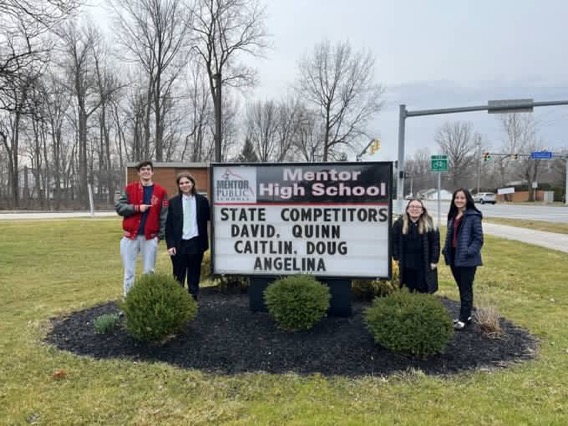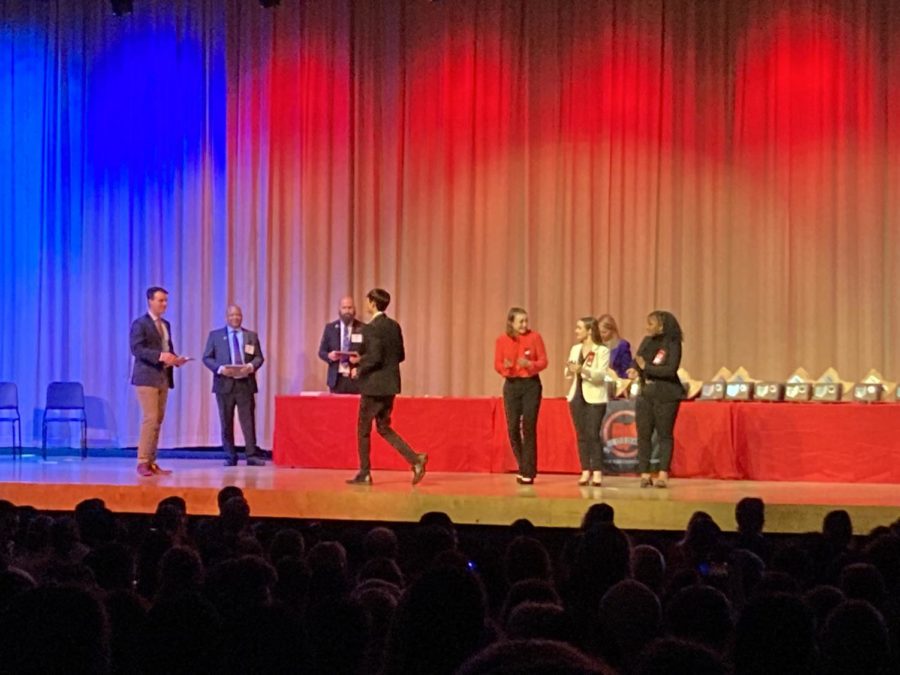Mentor Goes To The Ohio Speech and Debate State Tournament
Speech and Debate's Ohio State Tournament
March 14, 2023
On March 3rd and 4th, members of Mentor’s Speech and Debate team went to the Ohio Speech and Debate Association State Tournament. These individuals qualified through multiple methods, either as Congress members, winning at littles district (state qualifier tournament) or bigs district (national qualifier tournament), or winning throughout the season and earning bids. While I personally didn’t qualify for the state tournament, We were fortunate enough to have four individuals qualify for states through these methods: Doug Slovenkay, David Kovitch, Quinn Fuerst, and Caitlin Wong.
I got the pleasure of interviewing these individuals about their experiences from prepping for the state tournament, to the tournament itself, and to what they wish they would have done.
What event do you do and what is it like?
Doug: I compete in Dramatic Interpretation, where competitors take an 8-10 minute excerpt from a piece of literature and act it out in a dramatic fashion. Essentially, it is just a really long dramatic monologue.
Quinn: I compete in congressional debate which allows me to act as a member of Congress. Here I debate with 16 other students on many hot topics such as infrastructure bills and protecting our environment.
David: Currently, I do Congressional Debate in speech and debate, and it’s fairly similar to a professional Congress. You’re in a room with around 20 other students, and are tasked to give a speech surrounding a specific solution, a piece of legislation, to a current world problem and why it should or should not be passed. There are other jobs that are more into controlling the room you are in (like) the presiding officer role, and judges are placed in the room as well. The nice thing about Congress is that you are able to pick a side you agree with or have the most evidence for, which is not the case for other debate events.
Caitlin: I have done informative speaking for the past two years. For this event, you can choose any topic to write a 10 minute informative speech on. I’m always entertained by the diversity in the topic people choose; I’ve heard speeches ranging from the evolution of the avocado to the history of ramen noodles to the implications of shrink-flation. My speech this year was on optical illusions, a topic I was able to do because this event allows speakers to create visual aids to go with their speeches.
How did the entire season go for you?
Doug: My season got off to a very delayed start because I was having a difficult time finding a script that I enjoyed. This resulted in me only being able to compete in four tournaments prior to the postseason, but those four tournaments did go very well for me as I recorded three top-six finishes. I qualified for states after winning the OSDA Cleveland District tournament and ended up placing fourth in the state at the OSDA State Tournament. Overall, I am proud of how my season went and I am happy with the progress that was made!
Quinn: The season was amazing. This year I was able to compete in person. This was an incredible experience and made me enjoy speech and debate that much more. Being able to connect with the other competitors and meet people from other schools was great.
David: For my first year in speech in debate, it overall went very well. I was able to get my bearing around the first couple of tournaments that I participated in, and during the end of the season I felt very confident in what I was doing for Congress. I have gone to around six tournaments if you count states, and over all this was all very good experience for me in public speaking, and a great introduction to the speech and debate team.
Caitlin: I had a bit of a slow start to the season when I was still memorizing my speech, but soon I was placing in every tournament I went to! I was quite surprised at my success, but I’m proud the hard work my coaches and I put into the season paid off.
What did your preparation for states look like?
Doug: At the tournament just prior to states, I had a showing that I was not entirely proud of, so I felt as if I needed to use the two weeks prior to states to make some changes in order to have a performance that I could be proud of. In order to accomplish this, I cracked open the original version of the script that I ended up using and looked for some potential additions to the edited version of it that I had been performing. Then, I worked on nuances such as pacing and enunciation as I had received several comments from judges suggesting that I needed to improve upon these areas. Finally, our assistant coach, Mrs. Coleman, allowed Caitlin and I to perform our speeches to one of her classes in order to get in a final “test run” of our speeches prior to the state tournament.
Quinn: It looked very similar to any other week. The difference is the fact that we had more legislation to research. Therefore David and I had to research 3 weeks prior to states.
David: Most of my preparation for states was researching my current topic, and creating/practicing the speeches that I created. Some of the other events really only require memorization or already existing speeches, but for Congress I had to create and research all of my speeches in under three weeks.
Caitlin: Because I qualified for the state tournament through the “bid” system in January (the state tournament wasn’t until March), I had an entire month where I wasn’t competing. To get my speech back in shape for states, I performed it a couple times for small groups of teachers and students. I also ran the speech many times in the week leading up to the state tournament to make sure I remembered it.
What were your feeling before the tournament?
Doug: While I did have plenty of nerves entering the tournament, I would say that generally speaking, I was more excited than nervous. Being my senior year, I was really looking forward to doing what I could to give both myself and my speech a proper sendoff.
Quinn: I was super excited to compete with people from across the state.
David: Before the tournament, I felt extremely nervous and worried about how I was going to do in states, as this was my first year of speech and debate, and my first time going to states. When the day came however, I felt fairly confident in what I had prepared, and was excited to see what was ahead for me.
Caitlin: I was surprisingly calm. I had been very nervous the year before, but I knew that if I got through it last year, I’d be fine this year! I was exhausted on the bus ride there and slept through the whole drive.
What was your experience at the State Tournament?
Doug: My experience at the state tournament was a very positive one. I loved having the opportunity to make new friends from all over the state and celebrate one another’s accomplishments. It was an enjoyable end to my speech and debate journey.
Quinn: It was overall very good. However, it was interesting because many people in Congress compete in other events throughout the year so I did not see any familiar faces.
David: It was a good experience, but was very challenging with the people that I was against. I was a bit stressed because I had to manage many other things in the room in the beginning, and still had to worry about my speeches. Over all it was a good tournament, and I am very glad I even had the opportunity to attend states in the first place.
Caitlin: I had a great experience at the state tournament. During the regular season, I hear the same speeches every week since many of the competitors in the Cleveland district go to the same tournaments, so I was excited to hear a lot of new speeches from people around the state. After I got eliminated, I was able to relax and watch some of my teammates’ rounds which was a great experience. The awards ceremony at the end was crazy; there was a mosh pit, dance music, and at one point I saw a cardboard cutout of Harry Styles crowdsurfing.
What do you wish you could have done differently to prepare for the tournament, if you got to do it again?
Doug: If I had to do it all over again, the only thing that I would change is that I would have liked to have worked a little bit harder in the week prior to the state tournament rather than saving the bulk of the work for the week of. This would have reduced my stress levels considerably!
Quinn: I would prepare earlier to give myself more time to write the actual speeches. This would also give me the ability to practice my speeches more, making my presentation smoother.
David: I really wish I took more time to prepare, whether that making practicing my speeches beforehand, or having more speeches prepared. In my case, many of the speeches I had prepared could not be delivered because of time restraints.
Caitlin: I can’t think of anything I would have done differently. I made it to the quarterfinals (top 24 in the state!), which was further than I expected to get. I had a bit of a memory slip up in my first round that day, so I suppose I wish I would have reviewed that section of my speech more thoroughly.
Any advice for people interested in speech and debate?
Doug: My advice would be to take some time to explore and research the many different events. There are so many options that often vary drastically from one another, meaning that there is truly something for just about everybody.
Quinn: I would say just get in there and join. This club provides you with so many life-long skills. This can be the ability to answer questions in an interview to general public speaking skills.
David: Do not be extremely intimidated by speech and debate. I was a bit intimidated by the professional nature of public speaking and the effort needed to put in when first staring out, but it is not as bad as it seems. All speech or debate events are fun and interesting in their own way, and you should’nt immediately turn it down if you don’t have any experience in public speaking. The main purpose is to improve your public speaking, and to have fun in the process.
Caitlin: If you’re on the fence, just join! Don’t be intimidated. The coaches are incredibly supportive and will help you find an event that you enjoy. I joined public forum debate my first year, and after realizing it wasn’t for me, the coaches helped me switch to informative speaking which was a much better fit! Speech and debate is a fun, low-risk way to practice your public speaking skills and ability to communicate on a weekly basis. I’m so glad I decided to join speech and debate my sophomore year, and I hope the team will continue to grow in the years to come!
Conclusion
These individuals put in a lot of hard work and it paid off, and deserve the applause. At the state tournament Caitlin Wong broke into the top 24 in informative speaking, and Doug Slovenkay placed 4th in dramatic interpretation.

